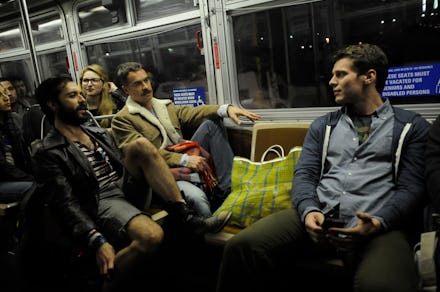'Esquire' Outrages LGBT Community with Homophobic 'Looking' Review

Esquire magazine's "A Straight Man's Guide to HBO's Looking," a review of the TV show that debuted this Sunday, is deservedly getting slammed across the internet for its homophobic overtures. Since the article's publication and subsequent blogosphere maelstrom, the editors have slapped a half-hearted note at the top of the article "Update: We apologize to anyone offended by our attempt at humor in this piece. It reflects one man's viewing experience. He does not think all gay people are boring. Just this show, a little."
What Stingley certainly does not want is complex, human characters — he wants a minstrel show.
To begin, the author, Mick Stingley, critiques Looking for "[committing] the heinous sin of being gay and boring" and says the characters are "no fun:" He writes "[I]nstead of, say, funny, mincing guys with witty one-liners and put-downs, Looking introduces three ho-hum characters you wouldn't hang around with if they were on SportsCenter."
It would appear that in Stingley's eyes, gay men can only exist if they display the campy humor long associated with them in pop culture. Either that, or they should be "starkly sad and depressing (Philadelphia; Angels in America)." What Stingley certainly does not want is complex, human characters — he wants a minstrel show.
Image credit: HBO via ThinkProgress
The article gets worse: "Also, after four episodes there is not one reference to The Wizard of Oz, All About Eve, or Barbara Streisand. (Erasure is played prominently in the second episode, though.) No one talks about fashion..." Does Stingley have any gay friends? Does he not know that, just as with any group of people, gay people have an infinitely wide variety of interests that lay outside of stereotypical bounds?
And in case you weren't sure from the title, Stingley is a straight man and therefore upset about the lack of female nudity: "There's only one female. Lauren Weedman plays Doris, a friend of Dom. It's too early to tell if she's just a friend, a 'token,' a 'lipstick lesbian,' or a 'fag hag,' but she doesn't take her clothes off."
Let's think about this: he's upset about the lack of female nudity ... on a show explicitly about gay men? That's like asking to see signs of human intelligence on Keeping Up With the Kardashians. Further, she too must fit into one of Stingley's incredibly simplistic stock characters. (FYI: when you put a term in quotation marks, it doesn't it any less "offensive.") Perhaps the grossest line of the piece comes when Stingley expresses his surprise that on the show, "guys hook up without fear of STDs yet no one looks like they're having any fun," because fun for gay guys obviously equals unsafe sex.
Esquire defenders will surely call it satire, but perhaps this "attempt at humor" should remain in the email chains of the men's mag editors instead of making the pages of the magazine.